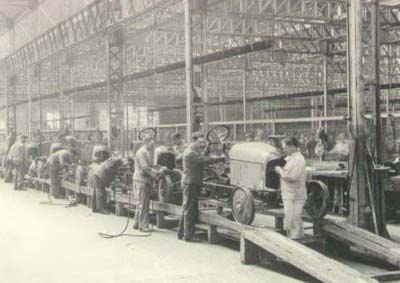-
Par zeuros le 4 Novembre 2008 à 20:12
Fordism and Taylorism<o:p></o:p>
The Fordism

The Fordism is named after Henry Ford . It refers to several social theories . Ford ( 1863-1947 ) was an American engineer . He founded the Ford Motor Company at Detroit in 1903 . He was a pioneer of standardization, mass production and the assembly line . By adopting these techniques he was able to produce reliable and low cost cars and other motor vehicles . He made his first “gasoline buggy” in 1893 and produced farm factors in 1915 .
The Fordism production system has 4 key elements :<o:p></o:p>
-The separation of different work tasks between different groups of workers , in witch unskilled workers execute simple , repetitive tasks and skilled workers undertake functions related to research , design , marketinq and quality control .<o:p></o:p>
-Parts and components of the motor vehicles are highly standardized . <o:p></o:p>
-The machines are arranged in the right order to manufacture the product .<o:p></o:p>
-Workers are working on an assembly line .<o:p></o:p>
The main goal of Fordism is to lower the manufacturing cost of the automobile . <o:p></o:p>
The Fordism production system was used again by other firms .<o:p></o:p>
<o:p></o:p>
The Taylorism
<o:p></o:p>
The Taylorism is named after Frederick Winslow Taylor . It’s also called Scientific Management . Taylor thought that decisions based upon tradition should be replaced by precise procedures developed after studies about a person at work . <o:p></o:p>
The Taylorism consist in : <o:p></o:p>
-developing a standard method to perform each job .<o:p></o:p>
-selecting workers with appropriate capacities for each job .<o:p></o:p>
-training workers for the standard method previously developed ; <o:p></o:p>
-supporting workers by organizing their work .<o:p></o:p>
-giving incentives payment to workers to increase output <o:p></o:p>
But the Taylorism ignores individual differences so it is efficient , but not for all the workers. <o:p></o:p>
<o:p></o:p>
<o:p></o:p>
=> Thanks to Ford and Taylor , America became an industrial country .<o:p></o:p>
Héliciane Palenzuela , 1èreS10 :)
 3 commentaires
3 commentaires
-
Par zeuros le 17 Octobre 2008 à 23:29
The anglo-greek controversy
Have the Marbles return to Greece or stay in the British Museum?
My own opinion about the actual controversy would give an advantage to Greeks.
Infact, I dont think a permission writen by a Turkish Head of Empire could establish equal right in the interest of one of its invaded and governed nation: Greece.
I can’t believe the ancient Vizier would have feel the vestiges of a great culture, he probably didn’t know, apply to him.
Moreover, when they conquered Greece, turkish soldiers and tir bullets attacked the monuments in question, witloof consciousness.
Otherwise, I believe in the symbol of the democratic philosophy and I think that the best things to represent it, are its makers’ constructions.
Today, Greek people are still persuaded democracy is a meaningful heritage of tir history and takes part of their common culture.
To conclude, these Marbles participate in the unit of the actual Greek people, permit them to have memories from their past and show the essence of the Greekness.
Furthermore, English already possess appropriate works for their history.
Marbles have consequently to return to its original place.
Lea, 2nde4. More about Elgin Marbles
 3 commentaires
3 commentaires
-
Par zeuros le 30 Septembre 2008 à 23:17
 4 commentaires
4 commentaires Suivre le flux RSS des articles de cette rubrique
Suivre le flux RSS des articles de cette rubrique Suivre le flux RSS des commentaires de cette rubrique
Suivre le flux RSS des commentaires de cette rubrique





